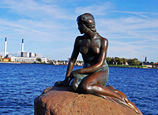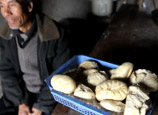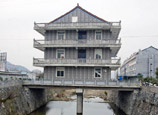
At present, thanks to effective policy, a robust market, and enterprises' vigorous efforts, as well as the mutual promotion of green consumption, the home appliance industry is forcefully entering a track of green development.
Policy boosting green market
Electrical home appliance is a key area of the work of energy conservation. Because energy-saving home appliances have high price, costly initial investment, and low social recognition, it is very difficult to open up the market by enterprises alone.
In order to promote the development of energy-saving home appliance, China has organized and carried out citizen-benefiting projects since June 2009, taking the lead to promote high-efficiency energy-saving air-conditioners and making significant achievements in bringing market to producers, benefits to consumers, and energy conservation and emission reduction to society. In a period of merely one year and a half, the central government has allocated RMB 11.54 billion Yuan to support the promotion of more than 34 million units of high-efficiency energy-saving air-conditioners, saving 10 billion kwh of electricity annually and 80 to 100 billion kwh throughout the life cycle of the products.
The market share of high-efficiency energy-saving air-conditioners rose from 5 percent before the promotion to more than 70 percent; and the price of high-efficiency energy-saving air-conditioners fell from RMB 3,000 to 4,000 Yuan before the promotion to around RMB 2,000 Yuan, saving consumers a total of RMB 30 billion Yuan of purchase cost.
Since the middle of this year, the government has accelerated the implementation of the "energy-saving products citizen-benefiting program" that focuses on energy-saving home appliances; the tentative plan is to promote 77 million units of energy-saving home appliances that include air-conditioners (variable frequency and fixed frequency), flat-screen TV, refrigerator, washing machine, and water heater (gas, solar energy, and heat pump).
According to the calculation of relative government departments, the central government will arrange RMB 36.3 billion Yuan to promote four categories of products, namely energy-saving home appliance, high-efficiency illumination, energy-saving automobile, and high-efficiency electric motor; it is estimated to boost consumption demands of about RMB 450 billion Yuan, saving about 12 million tons of standard coal.
Judging from current market conditions, energy-saving and citizen-benefiting subsidy boosts consumers' willingness to buy high-efficiency energy-saving home appliances. Air-conditioner is no longer the only star of green home appliance consumption; instead, all major categories of energy-saving home appliances are enjoying growth. According to monitoring statistics from China Market Monitor, taking TV as an example, since the implementation of the policy, the retail market share of TV products that won the bidding has increased from 43.3 percent to 92.0 percent.
The market shares of energy-saving refrigerator, washing machine, air-conditioner, and water heater have all improved to various extents; among these, the retail market share of the bidding-winning gas water heaters has increased by 3.8 percentage points in a period of three months.
Enterprises accelerate "green transformation" efforts
Faced with demand for consumption upgrading and the trend of green development, the home appliance industry is making vigorous efforts to turn challenges into opportunities and pressure into momentum. Oriented towards green development, led by key enterprises, and attaching great importance to reform and upgrading, the industry has made significant achievements.
The key for home appliance enterprises to promote green development is to make breakthroughs in core technologies. In order to make the best use of the green opportunity, leading home appliance enterprises attach more importance to technology innovation, hoping to boost market performance with technology progress.
In the past, Chinese air-conditioner manufacturers focused mainly on the production of fixed-frequency air-conditioners, while the market of variable-frequency air-conditioners, which have outstanding energy-conservation performance, was dominated by foreign companies.
In order to achieve the leap from fixed frequency to variable frequency, Gree has continuously increased investment in R&D and accelerated technology progress.
It has achieved major breakthrough in core variable frequency technology, its 1 Hz technology running at the very front of the industry. Thanks to its possession of core technology, Gree has greatly reduced its cost in making variable-frequency air-conditioners. Its products have outstanding energy-conservation performance, pushing the company's market share all the way up.
Home appliance enterprises should integrate green development in every aspect and process of the enterprises' operation. As a large manufacturer of all types of home appliance, Changhong bases itself on its own characteristics and makes vigorous efforts to promote energy conservation across the entire industrial chain.
Changhong has made technology breakthroughs in the high efficiency, environment friendliness, and energy conservation of core parts of screens and refrigerators and whole-unit products, its energy-saving products covering TV, refrigerator, air-conditioner, mobile phone, kitchen & bathroom, small home appliance, and illumination, among others. TCL and other enterprises have actively taken part in the recycling and processing of used electrical appliances, making contribution to the circular development of the home appliance industry.
As the initiative and creativity of enterprises' green development are incited, and with support and guidance from relevant departments, the energy-saving, emission-reduction, and environment protection work of the home appliance industry has been going on smoothly. China's home appliance industry has completely got rid of the ozone-depleting materials CFCs before schedule, and adopted environment-friendly natural materials to substitute CFCs, winning high acclaims from international community. Meanwhile, substitution of HCFCs is underway.
The energy efficiency of home appliance continues to improve, and that of some products is now on par with advanced international standard. On this basis, the home appliance industry is speeding up towards the goal of "the energy-conservation and environment friendliness level of China's main home appliance products should approach advanced international standard by the end of the 12th Five-year Plan, and the green design ability and comprehensive utilization ability of resources should have been significantly improved". The prospect for green development is getting even broader.
















 Going back home: A standing journey
Going back home: A standing journey


![]()
